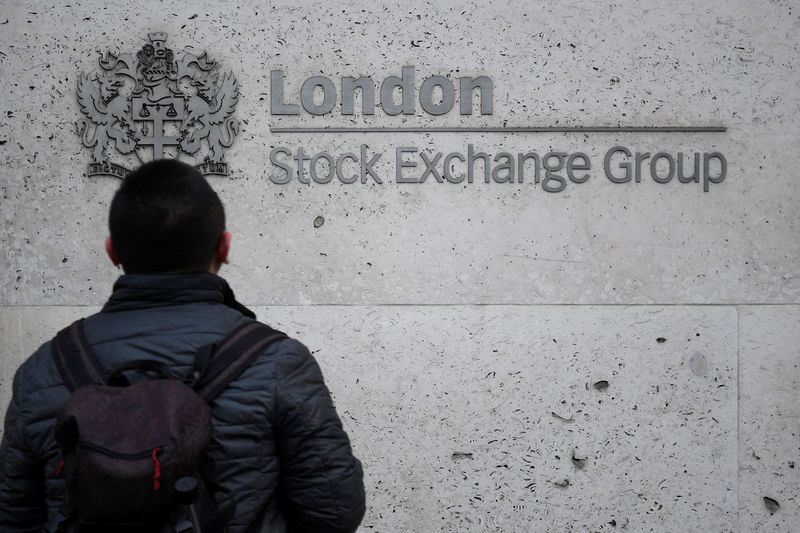By Marc Jones
LONDON (Reuters) - Suspected attacks on two tankers off the coast of Iran saw oil markets erupt out of their recent slump on Thursday and kept traders gobbling up ultra-safe government bonds, gold and the Japanese yen.
Brent surged as much 4% after reports of the attacks added to already heightened tensions between Iran and the United States. The area is near the Strait of Hormuz through which a fifth of global oil consumption passes from Middle East producers.
The crude spike helped Europe's oil producers pull stock markets there higher and lift Wall Street futures. There were also some stellar gains in the telecoms sector as Germany dished out new 5G mobile network licenses to some new entrants.
"Whenever you have an incident in the Arabian Gulf a little bit of nervousness always starts to kick in about that particular artery getting clogged up," CMC Markets senior analyst Michael Hewson said.
Given that oil was at five-month lows on Wednesday, people were taking precautions in case it might escalate into something more serious, he added.
"But personally I think it will be much like in the past, where you get a spike higher (in oil) but ultimately it doesn't change the underlying supply and demand dynamics."
Wall Street oil majors like Exxon Mobil (NYSE:XOM) and Chevron (NYSE:CVX) were pointing 1% higher while S&P and Dow e-minis were up 0.4% and Nasdaq futures climbed 0.6%.
But Asia had been a different story.
Hong Kong's Hang Seng dropped sharply again overnight as public tensions continued there about a bill which would allow extradition to China.
Doubts were growing too about any improvement in what U.S. President Donald Trump called "testy" trade relations with China before this month's G20 summit while some market anxiety emerged that Federal Reserve rate cut speculation may be overdone.
Investors will be looking to what Fed policymakers say after their next policy meeting on June 18-19, with Fed Funds rate futures pricing in a 25-basis-point rate cut for the subsequent policy review on July 30-31.
That is completely at odds with the Fed's projection three months ago, when policymakers saw gradual rate hikes in coming years.
"The U.S. real economy has not worsened that much. But given market expectations, the Fed will have no choice but to cut rates," said Kozo Koide, chief economist at Asset Management One.
RATE EXPECTATIONS
With bonds in demand again, the 10-year U.S. Treasury yield dipped to 2.113 percent, near Friday's 2.053 percent, its lowest level since September 2017, while in Europe, German borrowing costs sank back toward all-time lows.
Italy also paid the lowest rate in more than a year to sell seven- and 15-year debt on Thursday, helped by signals last week from the European Central Bank that it will keep borrowing costs down, and Rome's efforts to avoid a budget clash with Brussels.
Yields had tumbled in Asia too. Long-dated Japanese government bond yields hit their lowest levels since August 2016, before rising back a bit after a weak 30-year bond auction.
In Australia, long known for its high-yield currency, rates fell to record lows, with three-year yield now slipping below 1 percent after jobs data pointed to another interest rate cut in July to follow one last week.
Currency markets saw plenty of action as well. The safe-haven yen gained 0.2% to 108.32 to the dollar as risk sentiment soured, while the Australian dollar dropped 0.3%..
The euro steadied at $1.1293, having taken a hit on Wednesday after Trump said he was considering sanctions over Russia's Nord Stream 2 natural gas pipeline project and warned Germany against depending on Russia for energy.
The pound was still subdued at $1.2680 after British lawmakers defeated an attempt led by the opposition Labour Party to try to block a no-deal Brexit by seizing control of the parliamentary agenda from the government.
Turkey's lira tanked, though, dropping 1.4% as the rising cost of oil compounded tensions in Syria and a dispute with Washington over Ankara's plans to buy a Russian missile defense system.
"You still have a lot of uncertainty when it comes to geopolitics," said Manuel Oliveri, analyst at Credit Agricole (PA:CAGR).

"The focus is shifting to the G20 meeting. Risk sentiment remains relatively unstable," he added, while cautioning that expectations for interest rate cuts by the U.S. Federal Reserve were keeping investor confidence from weakening further.